Jewel Opens Up About Her Relationship with Sean Penn: "He Was a Persistent and Inventive Suitor"
In this exclusive chapter from new memoir Never Broken, the singer bares all.
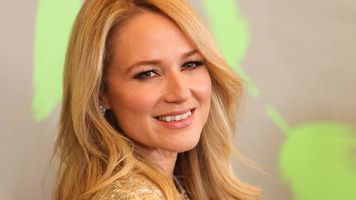
If you're a young, unknown artist in a highly competitive field, you have to find an edge, not only in the larger scope of the business among literally thousands vying for the few slots on the charts but also at your own label. There are hundreds of artists at any given time fighting for a piece of the same budget. The label can't invest in every artist at the same level, and like horse races, executives begin to bet on their favorite to win. They might prioritize someone they've signed personally. They might favor someone who seems easy to work because they are radio-friendly.
At this point, Danny Goldberg had left Atlantic, and I needed a new champion to protect me and fight for me. The person who stepped in was Ron Shapiro. He had seen me sing at a showcase in L.A. He believed unwaveringly in my talent and our careers became inextricably entwined. Although having an ally was not everything, I still had to work the system, within the label and outside it.
I took on a tremendous workload, as my only real secret weapon were live performances and my ability to outwork anyone. Because media didn't really care about me yet, I couldn't get on TV. Atlantic thought up crazy schemes to get me in front of people. I swallowed my pride and made it my job to make the best of any situation, to make people listen, and to make them remember me. And I tasked myself with making sure I didn't compromise on integrity or artistry. No excuse. Never once did I phone one performance in, or accept being treated as background music, no matter how hard the gig was to conquer.
I was frustrated a lot, and it wasn't a lot of fun, but my competitiveness was rewarding. I was one gritty, mean, lean working machine. Fear of ending up on the street again was a powerful motivator.
Danny Buch in the radio department came to me at one point with the idea to circumvent national radio. He was an excitable and passionate person, and he nearly spit whenever he talked, his enthusiasm spilling out of him. "Hey! Jewel! I can buy an hour on shortwave radio, channel 540 AM, and we can go down to Broadway and we'll have a mile radius we can broadcast to! Do you know how many people there are in one mile of Manhattan?!" Me: "But how will people know to tune in?" Danny: "I'll have interns walk around during rush hour wearing signs that say, 'Hear new Atlantic recording artist Jewel on 540 AM,' and we'll have you stand on top of a van with a speaker system singing live for folks on the street, and we can broadcast the whole show out to the cars around you!"
It sounded like a long shot, and like zero fun. There was no way to sing louder than the honking horns of New York City traffic, but I sang my little heart out standing on a white van, taking in the sights when I had the courage to open my eyes, interns walking around the block with their cardboard signs. Earlier that same day I'd sung at the opening of a shoe store in Times Square. In these instances and others I learned more about how to make people stand still and pay attention to the fact that I was an actual living, breathing person in the room, not a soundtrack pumped in. I would hold notes. I would yodel. I would say shocking things or make up songs about people as they walked by. Whatever it took to make eye contact, to make them stand still and listen. If I could get them to listen, I could get them to care.
Whatever it took to make eye contact, to make them stand still and listen. If I could get them to listen, I could get them to care.
I also participated in something called Earth Jam in the morning because they helped fund the tour. They had a rental van and sound gear and the sound guys, so I had free transportation to my own gigs, but I had to perform in the morning at high schools where they first did an environmental educational component and then I'd sing.
Stay In The Know
Get exclusive access to fashion and beauty trends, hot-off-the-press celebrity news, and more.
On one occasion I was in Detroit, and there was a rapper named Jewell trying to break around the same time. I remember using the restroom, and as I was in the stall, I could hear one girl saying, "I'm so excited! Jewell rocks. I love the way that girl raps." Insert record screeching to a halt. What? The way she raps? I had a bad feeling. I had long hippie hair and was wearing a Pink Panther T-shirt and baggy jeans. I walked out, the whole gymnasium chanting, "Jew-ell!"—and the hands stopped in midair. Silence rang with deafening weight. I took it one step further, as I was already a flop, and started with "Pieces of You." She's an ugly girl, does it make you want to kill her? She's an ugly girl, do you want to kick in her face? She's an ugly girl, she doesn't pose a threat. She's an ugly girl, does that make you feel safe? rang out and emptied the place in half a song, the teachers actually exiting students row by row exactly like in a fire drill. The principal was spitting mad.
I did an insane amount of traveling and tons of shows. I remember trying to count: Between radio station visits where I played for listeners who'd won a chance to come in, local record stores (remember those?), opening for someone in the evening, doing my own coffee shop show at midnight, and then one more at a high school at 9 a.m., I probably averaged six shows and often two cities a day, driving zigzag through a state to cover as much territory as I could. I never took breaks. There were many comical moments where I locked my guitar in the car, or my stoner surfer driver-friend drove us to the wrong city while I slept, but boy did I learn the ropes. I had to settle out for myself, which means getting paid by the promoter and getting my piece of any merch sales. I was cheap, cheap, cheap, and every time someone at the label said, Hey, my artist is more important than Jewel, let's drop her, my supporters could say, She costs us nothing and works hard. That took the fight out of the equation. There was no risk in letting me work my brains out.
Conan O'Brien and his team always had a fondness for new music and I found myself booked on the show. I think I was wearing purple polyester pants with a black T-shirt and a tacky belt with a rainbow buckle.
Around this time, in 1995, I got my first TV break. Conan O'Brien and his team always had a fondness for new music and I found myself booked on the show. I remember I was exhausted and wearing the same outfit I sang in every night. I had no money for clothes and wore the same thrift store outfits I'd put together in San Diego. I knew nothing about glam squads, and my label was in no hurry to tell me about the miracle of hair and makeup and clothing stylists. I think I was wearing purple polyester pants with a black T-shirt and a tacky belt with a rainbow buckle that I loved. The performance was a huge break for me. For some reason, when people saw me sing, they had a stronger reaction than when they just heard me sing.
Soon after this performance I went home to Alaska for a short rest. It felt so good to sink my toes in the dirt and smell the cottonwood trees and ride my horse and recalibrate. I'd gone from being a strong, tan outdoorsy kid to a pale anemic musician who never drew a breath of fresh, unregulated air. To sleep, stare at the sea, and just write all felt good.
My dad was building another cabin and so I stayed in its unfinished cinder-block basement, but it was dry and free. I helped haul water up from the creek for the garden and for washing. There was no running water, but there was electricity and a phone line. One day my dad came to find me, saying, "Jewel, you must be getting some kooky fans out there in the Lower 48. Some guy just prank-called and said he was Sean Penn." "No shit," I said, chuckling. "What did you do?" "I hung up on the weirdo," my dad said. I knew I was making some die-hard fans out there, and had a few stalkers even though I wasn't famous. There were people in need of help who seemed to cling to my lyrics and music, thinking I would save them somehow. Maybe prank calls were par for the course. Dad walked back up to the cabin to find the phone ringing again. The person on the other end managed to convince him before he hung up a second time that he was indeed Sean Penn, and he had seen me on Conan and wanted me to write a song for a movie he was directing. My dad set the phone down, put his boots back on, walked over, and told me to come to the phone. I pulled on my own boots, walked several hundred yards across the meadow, taking in the beautiful light as it reflected off Kachemak Bay, and made my way to the other cabin, where the phone was sitting on the counter. It must have been ten minutes of waiting for whoever was on the line. The voice was unmistakably Sean Penn's. He had seen me on Conan and was working on a movie he'd written called The Crossing Guard. He wanted me to compose a song for it. I told him I would and he said he would meet me anywhere to screen the movie, I could name the day. I gave him my cell number and figured I would never hear from him again.
One day my dad came to find me, saying, "Some guy just prank-called and said he was Sean Penn.
When I was in L.A. shortly after that, he saw a show of mine at the Wiltern. He screened the film for me the next day. The movie was intense and dark and interesting. Sean was the same, and also charming, witty, and bright, and our instant verbal sparring characterized our friendship for the next year. I was headed back to San Diego for a long-overdue surf session, and we agreed to talk creative soon.
Several weeks later I was in a salon, getting a cut from my gay hair-dresser and friend, when Sean called, saying he was in San Diego and asking where we could meet. I gave him the address of the salon, and the next thing I knew, a town car had dropped him off and my car was all we had left. My hairdresser asked if he could come along—although I have no recollection where we were headed. Sean was friendly and unpretentious and said sure. My car was a total mess. Like a holy mess. Clothes and food wrappers everywhere. There was so much crammed in there that the only open space was the front passenger seat. So Sean let my hairdresser sit on his lap. Who got no small thrill out of it.
I wrote a song called "Emily" for the movie while out on the road. I cut it in a radio station on the station mic and Sean put it in the film. In the meantime, we spoke on the phone a lot and he was a fantastic flirt and I did not mind one bit. But I intended to give him no such conquest. I put that man through his paces and he took it in stride. He began to court me in earnest, following me around on tour, acting as my de facto roadie. I was nowhere near famous, opening for Peter Murphy of Bauhaus in small clubs. Goth fans in makeup, fangs and scars, and black clothes. I'd play earnest folk songs and inevitably stop mid-song to ask someone to be quiet or kick someone out. Sean stood side stage. We talked about art and books and had a great time. I moved very slowly with him but he was a persistent and inventive suitor, and I enjoyed it immensely. He sincerely believed in my music, and this felt as good as anything. He was a talented artist and took my songs and lyrics seriously, and I was starving for anyone who believed in me. I kept our burgeoning relationship very quiet. I was determined not to be "discovered" because I was dating someone in the public eye. I liked his mind, and had fun sparring with him. When I told him this in all seriousness, in a dive bar after a sound check, he responded with a melancholy stare and then a canary-eating grin and said that it would be impossible not to fall in love with me. I looked at him to see if he was serious. It seemed he was.
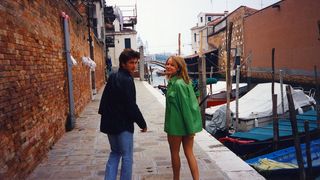
When the movie was finished, he asked me to go to the Venice Film Festival with him to debut it. I was nervous and excited—so far my experience in the music biz had been decidedly not glamorous. My time with Sean wasn't spent at Hollywood parties, but on the road with me at Red Roof Inns, where he would get his own room and carry my guitar back after my humiliating gigs. No tabloid had yet picked up on us, so I was anxious about a trip like this. At the same time, I couldn't turn it down. It was the first time I'd ever been out of the country apart from Mexico. I told him I didn't have the money for a ticket. He said I could fly on the private plane with him.
Sean said there would be a red carpet and lots of press and I would need to bring something to wear. I didn't want to walk down a carpet with him, and he said I could walk it on my own as songwriter for the film, which seemed okay. It was my first time getting gussied up with a professional stylist. The very fashionable woman eyed my polyester ensemble and began to pull dresses—as I tried them on I felt like a dog someone had dressed in sunglasses and a ball cap and a sweater. I also felt a little like Cinderella going to the ball. But I was not a girly princess and not used to standing out unless I was standing behind a guitar. I finally decided on a pair of satin pants and a beaded asymmetrical top that showed a bit of midriff. I had no idea how to do makeup or hair, and had no idea there were teams of people to do it for me. At a TV taping before leaving for Venice, I confided to the union hair and makeup lady, and she was kind enough to spend an hour with me and teach me how to put on eyeliner and shadow. I showed her a Polaroid of my outfit, and when she found out I owned no makeup, she gave me a lip liner, a blush, and shadow from her kit. She then drew pictures and step-by-step instructions on a piece of paper that I could refer to when the time came to get ready. I thanked her profusely and then kept busy with work so I wouldn't have time to be too nervous. My manager Inga took me shopping at a Nordstrom Rack store for cute shorts, coats, and sweaters, and I was ready to go.
Sean began to court me in earnest, following me around on tour, acting as my de facto roadie.
The day arrived for the flight and there I was walking onto a private jet and finding myself face-to-face with several other Hollywood types. I tried not to make a fool of myself, but I fear I may have asked to feel people's noses when a good one came around. When I studied sculpture in school I'd become obsessed with feeling faces so I could better feel the shape I had to re-create. Particularly feeling the tips of people's noses. The curve and spring of each was so idiosyncratic that when I saw a good nose, I'd ask complete strangers if I could feel it.
First we went to Paris. We stayed in beautiful hotels and ate with Roman Polanski. Of course I had to be told who he was. I had shocking gaps in my knowledge of pop culture and knew no one, nor who anyone was. Sean would whisper in my ear and explain everyone's backstory to me. It was not my world and I was pretty sure it never would be. Sean took me to see the sights in Montmartre and wrote me sweet notes that he hid in my pockets. Next was Venice, and while Sean was in meetings, I took water taxis around and explored canals and cathedrals. Heaven. It felt exotic and luxurious to be so free. I'd never been on this side of travel—"this" meaning not staying in youth hostels and hitchhiking with knives. This was the Cipriani and private drivers and all the food I could eat, like fresh figs and prosciutto. Interesting people to talk with, some well educated, some well read, some simply vain and drunk on their power, but altogether an especially rarified, fascinating breed I had not come across before. I recorded each moment in my mind to write about later. One day I went to lunch with several women and Jack Nicholson. He was gregarious and entertaining. He struck me as very bright and possibly bored with most people, able to cope with the help of a mild combination of recreational drugs and a curiosity for watching interesting circumstances unfold. I liked him. I can only imagine what he thought of me—I looked like I was twelve. None of it was lost on me, but it was all a game and I was enjoying myself. I trusted myself to be me. I enjoyed Sean and would eventually fall in love, but I did not go around holding hands or trying to be seen or noticed. At the end of lunch, Jack said in his classic way, "Ladies, who wants to go lingerie shopping?" I declined.
The morning of the film premiere, I nervously pulled out my crinkled paper with the makeup instructions for a little review. I looked at the drawings and then at my face, and after about five minutes of frustration, abandoned the mirror and notes and went to find some food in the sun. When I came back, Sean's assistant, a friendly and outgoing Australian girl, had been tidying the suite and walked out of the bathroom with my makeup crib sheets in her hand. "Jesus Christ in hell, is this yours?" I froze for a second and just stared at her. She looked at me with a broad smile and said, "You poor kid. You don't know how to put makeup on?" She didn't seem mean-spirited, but she was getting a kick out of it. She seemed to understand that this was nowhere near my world. She handed me my notes and left me alone with my thoughts, which felt like fish that had gotten spooked and swam away.
At the end of lunch, Jack Nicholson said in his classic way, "Ladies, who wants to go lingerie shopping?"
I did my best with the plum lip liner and the sheer nude lipstick, to highlight my brow bone and the lid of my eye, and worked the mascara wand into the lash line like I had been shown. I pulled my hair back simply and got dressed. I think Sean sensed how out of my element I was, and he was kind and careful to give me my space. When I walked out, he said I looked beautiful.
It was really cool to hear my song on the big screen. The next day the producers and industry folks got together for some big lunch, and Sean asked me to sing. He seemed to love watching people's reaction to me, and I'm sure he was also trying in his way to get the word out about my music. Someone handed me a guitar and I sat up at the banquet table, the whole room staring at me. No mic. Just a giant ballroom full of jaded execs. It was broad daylight and the room was busy talking until Jack spoke up and asked me to sing "Angel Standing By." I obliged, not knowing where the hell else to start. I shut my eyes, blocked the room out, and focused on the message of the song and then on my heart and on the particular feeling of needing to feel peace when unsettled. Of needing to be told you are loved when you are scared. That small concentrated feeling expands outward like heat from a flame. I get goose bumps and my eyes tear and my voice shakes just slightly when I harness emotion and force it through my throat and out of me like a warm wave. No vibrato for this song. Straight falsetto tone. Tone and vibrato have different effects, and for this a straight clean tone can cut you like a divine knife. When I wrote that song I was seventeen, and it was only the singing that would help me get through the nights when my anxiety would rise to almost insufferable levels. I experimented on myself and found that a widespread vibrato distracted me but that a straight tone was pleasing and calming. I learned to let passion and angst spill out occasionally in riffs like I'll be right there baby, holding your hand, telling you everything's going to be alright, and then go back to a straight tone, creating a vocal map of my own longing. When I opened my eyes, the room was quiet and no one clapped for a moment. I suddenly worried that I was just another part of the long day they had to endure when the whole room erupted at the same time. Sean requested "Nicotine Love," about a woman who had been raped as a child and so damaged that she became a monster who wanted to harm men the same way she had been hurt. The performance was intense and cinematic. When I finished, the room was quiet again. Then applause. Folks came up to me afterward who'd ignored me previously. Sean stood back and watched their reaction. An agent came over and Sean told him that if he had any sense he would sign me to some acting jobs. "Will she fix her teeth?" the agent asked. I remember the look of total amazement on Sean's face. He shook his head. The agent looked at me, unconvinced.
Sean seemed to think I was talented and smart, which was nice, because no one had ever told me I was smart before. He enjoyed putting me in situations that brought out the best in me, and he never ridiculed what was still so half-wild and messy about me.
One day at lunch in L.A., Warren Beatty walked in and sat down. I knew Warren from the movies, but mainly I knew he had been with Joni Mitchell. That made him some sort of a god to me. Sean asked me to sing for him. "Would you?" Warren asked. I sang something with my guitar and Warren rested his head on his hands, looking up at me with a dreamy look on his face, like he was watching a kitten knit mittens. When I finished, he tilted his head toward Sean and after a dreamy sigh said, "Where did you find her?" as if I were a puppy or something that could be acquired. I laughed at the absurdity of it all.
Reprinted from NEVER BROKEN by Jewel with permission of Blue Rider Press, an imprint of Penguin Random House LLC. Copyright (c) 2015 by Jewel.
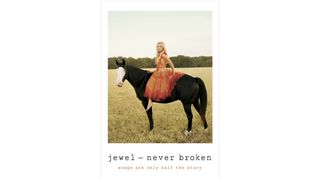
Follow Marie Claire on Instagram for the latest celeb news, pretty pics, funny stuff, and an insider POV.
-
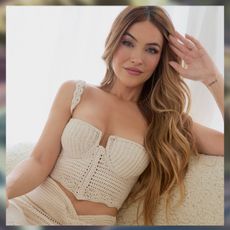 Chrishell Stause Will Play the Villain If She Needs To
Chrishell Stause Will Play the Villain If She Needs ToThe 'Selling Sunset' star has achieved what few (maybe no one) in the reality TV genre has: being a longtime fan favorite. But with her appearance on season 3 of 'Traitors,' she's ready to make enemies and get a little scrappy.
By Brian Moylan Published
-
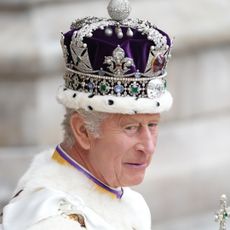 This Unexpected Royal is Richer Than The King
This Unexpected Royal is Richer Than The KingThe top three people on this list might surprise you.
By Kristin Contino Published
-
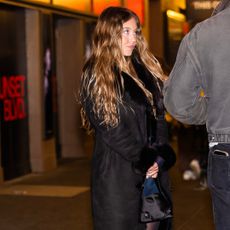 Sydney Sweeney Winterizes a Plunging Mini Dress With a Sheer Turtleneck and a Fur-Lined Penny Lane Coat
Sydney Sweeney Winterizes a Plunging Mini Dress With a Sheer Turtleneck and a Fur-Lined Penny Lane CoatThe star layered all her favorite cold-weather trends for a night on Broadway.
By Hanna Lustig Published
